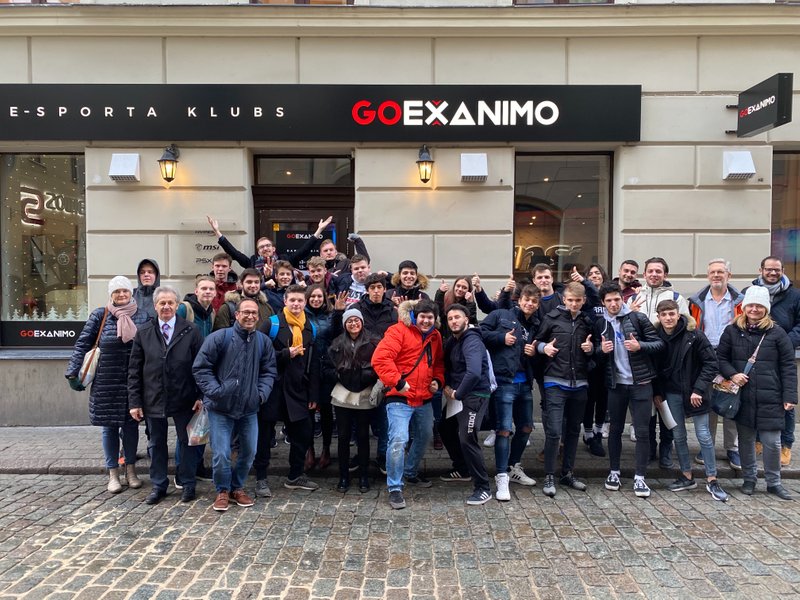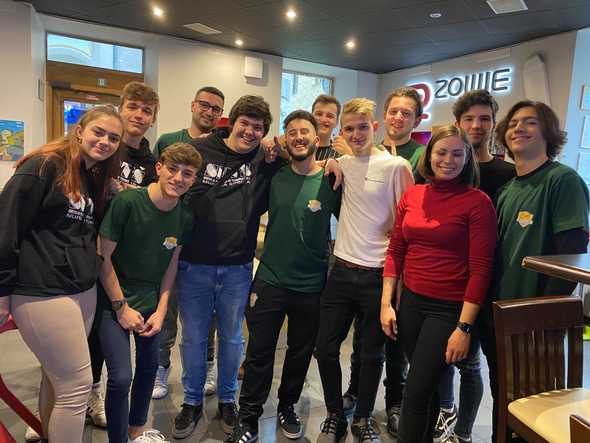The first tournament in Riga, Latvia
March 28, 2020
Riga welcomes Erasmus+
To learn how much gaming can positively influence any school student and thus also a student who has learning disabilities (LDs), the project partners met in Riga, Latvia, on March 3-5, 2020, for a League of Legends (LoL) tournament. When games are played competitively, they become e-sports which adds more excitement and sense of team to the whole process. The aim of this tournament was to see what the benefits of e-sports for young people are and how we can transfer these benefits to the school environment.
We were really happy with the energy and activity of our partners and their teams. \ Eva Birzniece \ Executive Director\ Latvian Dyslexia Association
5 teams - one winner!
There were five participating teams in the face-to-face tournament – a team of Srednja poklicna in tehniška šola Murska Sobota from Slovenia led by their very enthusiastic IT teacher Dominik Letnar, Hodina H from Czech Republic led by a young German volunteer Jesco Naeve, ACD La Hoya from Spain led by a true NGO warrior Jose Sánchez Jiménez, Check-In from Portugal led by a non-formal education guru and trainer Antonio Gomez and Latvian Dyslexia Association from Latvia led by Eduards Birznieks, a true gamer since early childhood. The Italian team from CORISS tried to participate from their hometown Tiriolo in the south of Italy (as they could not travel to Latvia because of travel restrictions imposed due to Covid-19 outbreak) but this was not possible because of the strict timing of the tournament.
The tournament was held in the premises of the e-sports club GoExAnimo which provided the necessary infrastructure including computers and Internet connection, organizational support, live streaming and casting of the games on the first day.
Double elimination = twice the excitement
The competition was organised as a double elimination tournament. The first day, the teams had took part in single elimination rounds that were entertaining and educational for the teams – they realized what in strategies and characters was working and what was not. The tournament caused a lot of debriefing and interaction both between the national team members and between the teams. For many participants they were significant and meaningful conversations.
The first day games were watched by approximately 2500 viewers on the GoExAnimo Youtube channel (first day stream & second day stream). This great interest in the project tournament was also thanks to the Slovenian partner whose school followed the games in real time from the hallways and classrooms of šola Murska Sobota. Even during the first day, it was obvious that the teams were very involved and there were enthusiastic strategy trading conversation between teams. Even somewhat less competitive people cheered for their favourites. In downtimes, participants shared their favourite online games and gave tips for how to play.
The finals
The three teams to move forward to the finals next day were the team of šola Murska Sobota from Slovenia, the team of Hodina H from Czech Republic and the Latvian Dyslexia Association team. The winners were the Czech team followed by the Latvian Dyslexia Association team and the Slovenian team from the vocational school in Murska Sobota. The games were streamed again and watched by 1 000 followers. During day two, we had guest casters from our teams, which was also a new and valuable experience for them.
The main lessons from the first project learning activity are that e-sports tournaments require that all teams have their player accounts in place before the game and that there are basic rules observed during the games so that the players can fully concentrate on the game without any disturbances. Another important lesson is how extremely engaging these tournaments can be and how much they foster engagement. And the final lesson which is more of a sad conclusion is that even though some students with LDs can be excellent gamers which requires many high level cognitive like memory, focus, analysis and inter-personal skills like communication, forecasting and leadership, this still does not generalize (at least not easily and massively) in acquiring basic academic skills like reading and spelling.
Altogether, we had four participants with LDs in this tournament and we hope for more in the next two upcoming ones in Slovenia and Czech Republic.

